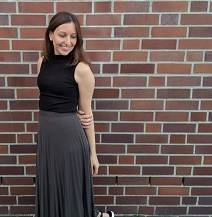An Inside Look: Schauspiel Hannover
Last week, Theatre Trip got to experience a show and behind-the-scenes tour at Schauspiel Hannover (“schauspiel” is German for “play/drama”). The theatre is partnered with the Staatsoper Hannover, the city opera house. And, it houses five different locations for music and theatre around Hannover – the Schauspielhaus, Cumberlandsche Bühne, Cumberlandsche Galerie, Ballhof Eins, and Ballhof Zwei.
The show that Theatre Trip got to see is taking place at the Schauspielhaus – Der schwarze Obelisk (The Black Obelisk). It’s their first production of the season, and it’s based off of a novel by Erich Maria Remarque, a famous German writer. The piece was directed and adapted for the stage by Lars-Ole Walburg, who we also got the chance to have a chat with (see below).
Location: Hannover, Germany
Our experience at Schauspiel Hannover:
Der schwarze Obelisk is centered around the year of inflation in Germany in 1923. The play deals with the topics of politics, finance, business, and mental health, which were all common areas of struggle at the time. Although the issue at hand is heavy, there are still moments of humor and relevant connections to the present.
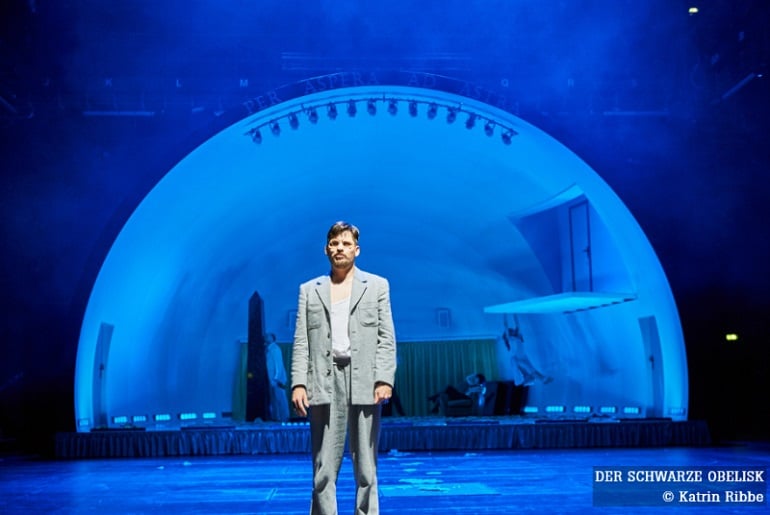
This production features a cast of strong actors, including Carolin Haupt, Antonia Eleonore Hölzel (see interview below), Silvester von Hösslin, Janko Kahle, Christoph Müller, Hagen Oechel, Jonas Steglich, Sebastian Weiss, Tronicat la Miez, and Die Klosterbrüder. This piece was directed by Lars-Ole Walburg (see interview below), and the stage design is by Robert Schweer (see interview below). Costume design is by Nina Gundlach, musical direction by Lars Wittershagen, and dramaturgy by Kerstin Behrens.
Theatre Trip’s Chat with Robert Schweer:
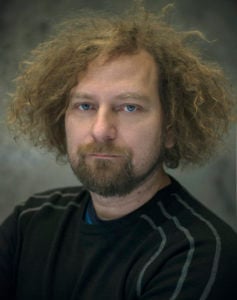 Robert Schweer is the stage designer for Der schwarze Obelisk. He studied theater and event technology and has since worked in stage design in Berlin, Munich, Zurich, Frankfurt, Vienna, Dresden, Düsseldorf, Köln, and Hannover. He has been regularly collaborating with director Lars-Ole Walburg since 2002.
Robert Schweer is the stage designer for Der schwarze Obelisk. He studied theater and event technology and has since worked in stage design in Berlin, Munich, Zurich, Frankfurt, Vienna, Dresden, Düsseldorf, Köln, and Hannover. He has been regularly collaborating with director Lars-Ole Walburg since 2002.
Theatre Trip: What initially inspired you to become a stage designer?
Robert: After my studies, I originally wanted to become a scenographer for film, but it was hard to start and find people who really wanted to film in a designed surrounding. Plus, there was no budget at all. So from there, I studied theatre and stage technic as engineer in Berlin, played guitar in a punk band, and learned to love theatre through “Volksbühne Berlin” in the early 90´s.
I later became the head of production and realization at Theatre Basel Switzerland. After three years of learning a lot, I realized that I really wanted to see my own ideas on stage, which meant quitting my job in order to live that dream with full power. It turned out to be a good decision.
Theatre Trip: What physical/artistic skills would you say are required to succeed in this field?
Robert: There are so many ways to express your ideas and because of this, you have to find your own specific tool that enables you to do so. Of course, it helps if you can draw and work with material, lights, and machinery. But first you have to develop an idea out of a text and understand what’s important for you to tell. Fortunately, you can usually find help with your director throughout the process.
Related Topic: Hannover Theatre Guide – All You Need to Know
Theatre Trip: What has been the biggest challenge you’ve had to face in your career so far?
Robert: It always seems to be the next design. It can be a challenge to create ideas under time pressure.
Theatre Trip: What’s next for you?
Robert: Next up will be Maria Stuart at Schauspiel Graz (directed by Stephan Rottkamp), followed by Robin Hood at Schauspielhaus Hamburg (Markus Bothe), and Heiner 1-4 at Berliner Ensemble (Lars-Ole Walburg).
Theatre Trip’s chat with Antonia Eleonore Hölzel:
Antonia Eleonore Hölzel is a Munich-born actress who studied acting at Zurich University of the Arts. She has acted in a wide range of theaters, been a spokesperson for radio plays, and she now plays the role of Gerda in Der schwarze Obelisk.
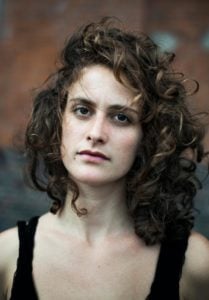
Theatre Trip: When did you first discover your passion for acting?
Antonia: I first discovered my passion when getting involved with a school play. The director from that play told me that I should really think about following my passion because he could see something in me. At the time, I honestly didn’t even know that it was possible to become an actress. I lived in the countryside and there wasn’t even a theatre nearby. But step by step, I followed this path, and now I’m here.
Theatre Trip: In your opinion, do you think that formal education is necessary in order to become a professional actor/actress?
Antonia: No, I don’t think that it’s necessary. But it’s a nice education in any case, and a very enriching experience. You can learn a lot about yourself, your body, space, people, and theatre in general. It’s like having a long intense workshop with a lot of very nice and interesting courses. That said, you work in a very different way in the theatre than you do in school, which is why I wouldn’t say it’s necessary. Although there are definitely some aspects of theatre that a formal education can help you with.
Theatre Trip: Do you have any pre-performance rituals?
Antonia: Yes. I need to be alone a little bit. I breathe and I do some warm ups. Sometimes I sing. I wake up my body. And I go through the text once, sometimes even on the same day of the performance.
Theatre Trip: Is there a specific play that you think all theatre students and professionals should read?
Antonia: I have two of them. Alles weitere kennen Sie aus dem Kino (The Rest Will Be Familiar To You from Cinema), by Martin Crimp and Zement, by Heiner Müller.
Theatre Trip’s Chat with Lars-Ole Walburg:
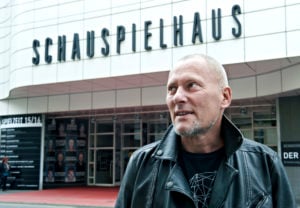
Lars-Ole Walburg studied theatre and German at the Freie Universität Berlin, and has since worked on many projects as both a director and a dramaturg. He has been regularly collaborating with stage designer Robert Schweer since 2002, and is now an artistic director at Hannover’s Schauspielhaus.
Theatre Trip: What initially inspired you to step into the theatre world?
Lars: Like it happens often in the lives of young people, my path to the theatre was more of a coincidence. I lived in East Berlin in the 80s and was waiting for my departure. During this time, I got to know many theatre people and first felt the subversive power of theatre as a spectator. That impressed me very much and I therefore studied theatre science when I finally arrived in West Berlin.
Theatre Trip: Has there been a specific moment in your career in which you were especially proud of a production or accomplishment?
Lars: There were many such moments. Sometimes it was the happiness of a special working relation or the idea for a scenic solution. But what I particularly appreciate is the feeling of being overtaxed – when I feel that a production is bigger than the sum of its parts. Things happen that I can’t foresee and I stand amazed like a stranger in front of my own work. In Death and Resurrection of the World of My Parents in Me, it was like this. It’s a text volume by Nis-Momme Stockmann that puts the utmost strain on the theatre and from which a really important 5-hour production emerged.
Theatre Trip: What has been the biggest challenge you’ve had to face in your career so far?
Lars: Actually theatre accidents. Sometimes the theatre can be a very dangerous location and when an actor is injured, it is a terrible paralysis that questions everything. It’s terribly difficult to find a way to deal with it and I don’t always succeed.
Theatre Trip: What advice would you give to an aspiring theatre director?
Lars: I am not really a person of generous advice and I try not to impose my opinion on other people. But two suggestions would be peculiarity and incorruptibility. This can apply to everyone who wants to make art.
Theatre Trip: Is there a play or book that you think all theatre students and professionals should read?
Lars: Definitely not a theatre book, but perhaps Traktat über die Gewalt, by Wolfgang Sofsky or Das kommunistische Manifest, by Marx und Engels.
Theatre Trip’s Behind-The-Scenes Tour at Schauspiel Hannover!
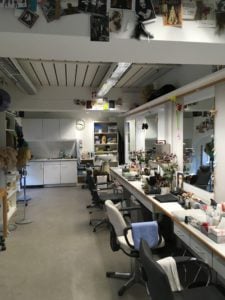
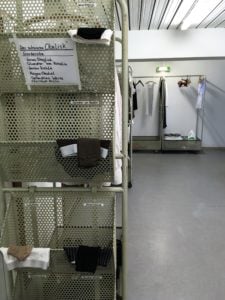
Thanks to the support from Schauspiel Hannover, Theatre Trip was also able to go on an exclusive behind-the-scenes tour of the theatre! We checked out the dressing rooms, stages, set storage areas, and hair and makeup rooms. We even got to sit in on an exciting dance rehearsal.
One of the highlights was being able to get up close and personal with the costumes and set from Der schwarze Obelisk. One thing particularly unique about the Schauspielhaus is that their costume and prop department is so extensive that they house all of the physical items in a warehouse outside of the city.
Also, they have three employees who are devoted to nothing but the creation of hats and headwear! To be fair, these creators also have to make hats for the opera house, which can be quite a few heads to cover throughout the course of a year.
Fun Fact: Not only are the actual costumes hung and laid out for all of the performers before each show, but their underwear is laid out for them as well! This is due to the superstition in the theatre that it’s necessary to strip down and put on an entire set of new clothes in order to get fully into character.
Have you ever been to Schauspiel Hannover?
If so, we would love to hear all about it in the comments below! And in the meantime, you can always check out our blog post archive of past theatre visits for some insight on what’s going on in theaters around the world!
Learn More:
*The featured image is by Katrin Ribbe.
* A special thanks to Schauspiel Hannover for inviting us to the show and backstage tour!
Want to stay in the loop with all things related to musical theatre?
Author: Stacy Karyn
Stacy Karyn is the founder of Theatre Trip, author of The Thespian’s Bucket List, and creator of The Cast Album List. She holds a BA in theatre, a TESOL drama certificate, and has worked and interned with Broadway and Off-Broadway theaters.



